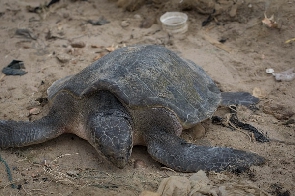Sea turtles are vital for maintaining healthy ocean ecosystems and fisheries, and the Environmental Justice Foundation (EJF) is working with coastal communities in Ghana to protect them. This is helping to restore fish populations, reducing the impact of overfishing and supporting Ghana’s marine wildlife into the future.
Since 2019, EJF’s turtle conservation project in Ghana has saved thirty-nine sea turtles and safely released them back to sea. The turtles came from a range of species: 27 Olive Ridleys, 5 Leatherbacks, 5 Green Turtles, 1 Hawksbill and 1 Loggerhead. Olive Ridley, Leatherback and Green turtles nest routinely along Ghana’s coastline. Leatherbacks are the largest sea turtle species and undertake the longest migrations between breeding and feeding areas of any sea turtle, averaging an astonishing 3,700 miles each way. Loggerheads and Hawksbills also visit Ghanaian waters. However, all these species are in decline in Ghana, and they are threatened globally.
The rescues were made possible through a community-led approach to protecting sea turtles. Out of the 39 safe releases achieved by EJF, 28 were turtles caught mistakenly by fishers. The turtles were entangled in their nets, and the fishers wanted to sell them to turtle meat processors to offset the cost of their damaged nets. However, the patrol teams were able to negotiate with the fishermen and the turtles were released back into the sea.
The remaining 11 were found by turtle poachers during the nesting period but the patrol teams successfully persuaded them to release the turtles. Sadly, however, not every turtle was saved – two Leatherbacks were killed at Senya Breku and one Green turtle died entangled in fishing nets.
These conservation efforts are protecting turtles, but also the wider ocean ecosystem. Studies show that sea turtles play a vital role in maintaining healthy oceans and fisheries by grazing on seagrass, maintaining coral reefs and regulating the populations of the jellyfish which prey on fish eggs. In addition, the eggs sea turtles lay on Ghana’s beaches supply nutrients that support coastal ecosystems.
In Ghana, sea turtles are commonly poached when coming to nest on the shore or unintentionally entangled in fishing nets. Nest destruction by dogs and coastal development also pose serious problems. This means taking action now to protect sea turtles is essential to ensure their continued survival and to maintain the significant benefits they bring to coastal communities, says EJF.
The project has been running since 2019 in Gomoa Fetteh, with an extension to Senya Breku in 2021, working to protect sea turtles through beach patrols, as well as producing films to build support for community-based turtle conservation.
EJF CEO and Co-Founder Steve Trent said: “When Sea turtle populations decline, the vital roles they play in ocean ecosystems disappear with them. This means that restoring thriving sea turtle populations brings a direct economic benefit for fishers and coastal communities in Ghana. It is time to protect sea turtles, and rebuild their populations, to ensure healthy and resilient oceans for the future.”
As Ghana joins the rest of the world in marking World Turtle Day today, EJF will continue to encourage poachers to end their poaching activities and instead become protectors, bring children into the campaign as future turtle defenders, provide supplementary livelihood support for turtle processors and expand the successful beach patrol approach to other coastal communities.
Opinions of Wednesday, 24 May 2023
Columnist: Charles Smith
Protecting sea turtles for a more sustainable ocean in Ghana
Entertainment














